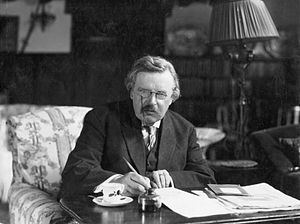The Human Tree
Gilbert Keith Chesterton 1874 (Kensington, London) – 1936 (Beaconsfield, Buckinghamshire)
Many have Earth's lovers been,
Tried in seas and wars, I ween;
Yet the mightiest have I seen:
Yea, the best saw I.
One that in a field alone
Stood up stiller than a stone
Lest a moth should fly.
Birds had nested in his hair,
On his shoon were mosses rare,
Insect empires flourished there,
Worms in ancient wars;
But his eyes burn like a glass,
Hearing a great sea of grass
Roar towards the stars.
From them to the human tree
Rose a cry continually:
`Thou art still, our Father, we
Fain would have thee nod.
Make the skies as blood below thee,
Though thou slay us, we shall know thee.
Answer us, O God!
`Show thine ancient fame and thunder,
Split the stillness once asunder,
Lest we whisper, lest we wonder
Art thou there at all?'
But I saw him there alone,
Standing stiller than a stone
Lest a moth should fall.
Font size:
Submitted on May 13, 2011
Modified on April 16, 2023
- 47 sec read
- 100 Views
Quick analysis:
| Scheme | AAXBCCB DDDXEEX FFFGFFG HHHICCI |
|---|---|
| Closest metre | Iambic trimeter |
| Characters | 816 |
| Words | 158 |
| Stanzas | 4 |
| Stanza Lengths | 7, 7, 7, 7 |
Translation
Find a translation for this poem in other languages:
Select another language:
- - Select -
- 简体中文 (Chinese - Simplified)
- 繁體中文 (Chinese - Traditional)
- Español (Spanish)
- Esperanto (Esperanto)
- 日本語 (Japanese)
- Português (Portuguese)
- Deutsch (German)
- العربية (Arabic)
- Français (French)
- Русский (Russian)
- ಕನ್ನಡ (Kannada)
- 한국어 (Korean)
- עברית (Hebrew)
- Gaeilge (Irish)
- Українська (Ukrainian)
- اردو (Urdu)
- Magyar (Hungarian)
- मानक हिन्दी (Hindi)
- Indonesia (Indonesian)
- Italiano (Italian)
- தமிழ் (Tamil)
- Türkçe (Turkish)
- తెలుగు (Telugu)
- ภาษาไทย (Thai)
- Tiếng Việt (Vietnamese)
- Čeština (Czech)
- Polski (Polish)
- Bahasa Indonesia (Indonesian)
- Românește (Romanian)
- Nederlands (Dutch)
- Ελληνικά (Greek)
- Latinum (Latin)
- Svenska (Swedish)
- Dansk (Danish)
- Suomi (Finnish)
- فارسی (Persian)
- ייִדיש (Yiddish)
- հայերեն (Armenian)
- Norsk (Norwegian)
- English (English)
Citation
Use the citation below to add this poem to your bibliography:
Style:MLAChicagoAPA
"The Human Tree" Poetry.com. STANDS4 LLC, 2024. Web. 25 Apr. 2024. <https://www.poetry.com/poem/16001/the-human-tree>.



Discuss the poem The Human Tree with the community...
Report Comment
We're doing our best to make sure our content is useful, accurate and safe.
If by any chance you spot an inappropriate comment while navigating through our website please use this form to let us know, and we'll take care of it shortly.
Attachment
You need to be logged in to favorite.
Log In